- Home
- Harlan Coben
The Final Detail: A Myron Bolitar Novel
The Final Detail: A Myron Bolitar Novel Read online
PRAISE FOR
THE FINAL DETAIL
“In a genre crowded with accidental detectives who seem invented only to lure cat-loving vegetarians and other special-interest readers, Myron Bolitar stands out. The Edgar Award–winning author gives his characters memorable personalities … they are never plain-vanilla.”
—USA Today
“The Final Detail captures the author’s trademark humor, but don’t let Coben’s wry observations fool you. They gift wrap keen insights into our society, particularly America’s obsession with sports figures.”
—The Washington Post Book World
“Coben has melded sly humor, sophisticated plotting, and solid storytelling with bizarre yet believable characters. Coben has sculpted Myron into one of the most likable guys …. [The Final Detail] secures even further Coben’s place as a writer of substantial mysteries.”
—Chicago Tribune
“An amusing whodunit with an endearing sports agent … a hilarious tour of over-the-top New York.”
—Los Angeles Times
“This is a terrific entry in a terrific series.”
—Kansas City Star
“A crackerjack mystery.”
—Kirkus Reviews
“The strongest entry yet in a series that deftly balances realism with excitement.”
—Publishers Weekly
PRAISE FOR HARLAN COBEN
AND
THE MYRON BOLITAR NOVELS
“Harlan Coben is the freshest new voice in the crowded mystery-thriller field. Myron and Win are the best duo since Spenser and Hawk, Coben’s plots are gripping and the books have a terrific mix of comedy, suspense, and drama.”
—PHILLIP MARGOLIN
“Like fellow-wisecracking P.I.’s Spenser and Elvis Cole, Myron Bolitar is great fun in the best hard-boiled tradition.”
—Houston Chronicle
“Harlan Coben brings a new and exciting voice to the mystery genre.”
—The Armchair Detective
“MYRON BOLITAR IS ONE OF THE MOST ENGAGING HEROES IN MYSTERY FICTION.”
—DENNIS LEHANE
“Coben is writing one of the best humorous hard-boiled series around.”
—Mystery News
“If you’ve been entertaining doubts about the future of the mystery—fugeddaboutit! It’s in good hands with Harlan Coben.”
—LAWRENCE BLOCK
“THE WORLD NEEDS TO DISCOVER HARLAN COBEN. He’s smart, he’s funny, and he has something to say.”
—MICHAEL CONNELLY
“Harlan Coben is a terrific writer.”
—PETER STRAUB
BOOKS BY HARLAN COBEN
DEAL BREAKER
DROP SHOT
FADE AWAY
BACK SPIN
ONE FALSE MOVE
THE FINAL DETAIL
DARKEST FEAR
TELL NO ONE
GONE FOR GOOD
NO SECOND CHANCE
JUST ONE LOOK
THE INNOCENT
PROMISE ME
THE WOODS
HOLD TIGHT
CAUGHT] AFTER [CAUGHT]
Contents
Cover
Praise For: The Final Detail
Praise for Harlan Coben and The Myron Bolitar Novels
Other Books By This Author
Title Page
Dedication
Chapter 1
Chapter 2
Chapter 3
Chapter 4
Chapter 5
Chapter 6
Chapter 7
Chapter 8
Chapter 9
Chapter 10
Chapter 11
Chapter 12
Chapter 13
Chapter 14
Chapter 15
Chapter 16
Chapter 17
Chapter 18
Chapter 19
Chapter 20
Chapter 21
Chapter 22
Chapter 23
Chapter 24
Chapter 25
Chapter 26
Chapter 27
Chapter 28
Chapter 29
Chapter 30
Chapter 31
Chapter 32
Chapter 33
Chapter 34
Chapter 35
Chapter 36
Chapter 37
Chapter 38
Chapter 39
Chapter 40
About the Author
Copyright
For Aunt Evelyn in Revere,
with lots and lots of love
And in memory of Larry Gerson
1962–1998
Close your eyes and you can still see the smile
CHAPTER
1
Myron lay sprawled next to a knee-knockingly gorgeous brunette clad only in a Class-B-felony bikini, a tropical drink sans umbrella in one hand, the aqua clear Caribbean water lapping at his feet, the sand a dazzling white powder, the sky a pure blue that could only be God’s blank canvas, the sun as soothing and rich as a Swedish masseur with a snifter of cognac, and he was intensely miserable.
The two of them had been on this island paradise for, he guessed, three weeks. Myron had not bothered counting the days. Neither, he imagined, had Terese. The island seemed as remote as Gilligan’s—no phone, some lights, no motorcar, plenty of luxury, not much like Robinson Crusoe, and well, not as primitive as can be either. Myron shook his head. You can take the boy out of the television, but you can’t take the television out of the boy.
At the horizon’s midway point, slicing toward them and ripping a seam of white in the aqua-blue fabric, came the yacht. Myron saw it, and his stomach clenched.
He did not know where they were exactly, though the island did indeed have a name: St. Bacchanals. Yes, for real. It was a small patch of planet, owned by one of those mega-cruise lines that used one side of the island for passengers to swim and barbecue and enjoy a day on their “own personal island paradise.” Personal. Just them and the other twenty-five hundred turistas squeezed onto a short stretch of beach. Yep, personal, bacchanallike.
This side of the island, however, was quite different. There was only this one home, owned by the cruise line’s CEO, a hybrid between a thatched hut and a plantation manor. The only person within a mile was a servant. Total island population: maybe thirty, all of whom worked as caretakers hired by the cruise line.
The yacht shut off its engine and drifted closer.
Terese Collins lowered her Bolle sunglasses and frowned. In three weeks no vessel except the mammoth cruise liners—they had subtle names like the Sensation or the Ecstasy or the G Spot—had ambled past their stretch of sand.
“Did you tell anybody where we were?” she asked.
“No.”
“Maybe it’s John.”
John was the aforementioned CEO of said cruise line, a friend of Terese’s.
“I don’t think so,” Myron said.
Myron had first met Terese Collins, well, a little more than three weeks ago. Terese was “on leave” from her high-profile job as prime-time anchorwoman for CNN. They both had been bullied into going to some charity function by well-meaning friends and had been immediately drawn to each other as though their mutual misery and pain were magnetic. It started as little more than a dare: Drop everything and flee. Just disappear with someone you found attractive and barely knew. Neither backed down, and twelve hours later they were in St. Maarten. Twenty-four hours after that they were here.
For Myron, a man who had slept with a total of four women in his entire life, who had never really experienced one-night stands even in the days when they were fashionable or ostens
ibly disease-free, who had never had sex purely for the physical sensation and without the anchors of love or commitment, the decision to flee felt surprisingly right.
He had told no one where he was going or for how long—mostly because he didn’t have a clue himself. He’d called Mom and Dad and told them not to worry, a move tantamount to telling them to grow gills and breathe underwater. He’d sent Esperanza a fax and gave her power of attorney over MB SportsReps, the sports agency they now partnered. He had not even called Win.
Terese was watching him. “You know who it is.”
Myron said nothing. His heartbeat sped up.
The yacht came closer. A cabin door in the front opened, and as Myron feared, Win stepped out on deck. Panic squeezed the air out of him. Win was not one for casual drop-bys. If he was here, it meant something was very wrong.
Myron stood. He was still too far to yell, so he settled for a wave. Win gave a small nod.
“Wait a second,” Terese said. “Isn’t that the guy whose family owns Lock-Horne Securities?”
“Yes.”
“I interviewed him once. When the market plunged. He has some long, pompous name.”
“Windsor Horne Lockwood the third,” Myron said.
“Right. Weird guy.”
She should only know.
“Good-looking as all hell,” Terese continued, “in that old-money, country-club, born-with-a-silver-golf-club-in-his-hands kinda way.”
As though on cue, Win put a hand through the blond locks and smiled.
“You two have something in common,” Myron said.
“What’s that?”
“You both think he’s good-looking as all hell.”
Terese studied Myron’s face. “You’re going back.” There was a hint of apprehension in her voice.
Myron nodded. “Win wouldn’t have come otherwise.”
She took his hand. It was the first tender moment between them in the three weeks since the charity ball. That might sound strange—lovers alone on an island, the sex constant, who had never shared a gentle kiss or a light stroke or soft words—but their relationship had been about forgetting and surviving: two desperate souls standing in the rubble with no interest in trying to rebuild a damn thing.
Terese had spent most days taking long walks by herself; he’d spent them sitting on the beach and exercising and sometimes reading. They met up for food, sleep, and sex. Other than that, they left each other alone to—if not heal—at least stave off the blood flow. He could see that she too had been shattered, that some recent tragedy had struck her deep and hard and to the bone. But he never asked her what had happened. And she never asked him either.
An unspoken rule of their little folly.
The yacht stopped and dropped anchor. Win stepped down onto a motorized dinghy. Myron waited. He shifted his feet, bracing himself. When the dinghy was close enough to the shore, Win snapped off the motor.
“My parents?” Myron called out.
Win shook his head. “They’re fine.”
“Esperanza?”
Slight hesitation. “She needs your help.”
Win stepped gingerly into the water, almost as though he expected it to hold his weight. He was dressed in a white button-down oxford and Lilly Pulitzer shorts with colors loud enough to repel sharks. The Yacht Yuppie. His build was on the slight side, but his forearms looked like steel snakes coiling beneath the skin.
Terese stood as Win approached. Win admired the view without ogling. He was one of the few men Myron knew who could get away with that. Breeding. He took Terese’s hand and smiled. They exchanged pleasantries. Fake smiles and pointless bandies followed. Myron stood frozen, not listening. Terese excused herself and headed to the house.
Win carefully watched her saunter away. Then he said, “Quality derrière.”
“Would you be referring to me?” Myron asked.
Win kept his eyes keenly focused on the, er, target. “On television she’s always sitting behind that anchor desk,” he noted. “One would never guess that she had such a high-quality derrière.” He shook his head. “It’s a shame really.”
“Right,” Myron said. “Maybe she should stand a couple times during each broadcast. Twirl around a few times, bend over, something like that.”
“There you go.” Win risked a quick glance at Myron. “Take any action snapshots, perhaps a videotape?”
“No, that would be you,” Myron said, “or maybe an extra-perverse rock star.”
“Shame.”
“Yeah, shame, I got that.” Quality derrière? “So what’s wrong with Esperanza?”
Terese finally disappeared through the front door. Win sighed softly and turned toward Myron. “The yacht will take half an hour to refuel. We’ll leave then. Mind if I sit?”
“What happened, Win?”
He did not answer, choosing instead to sit on a chaise longue and ease back. He put his hands behind his head and crossed his ankles. “I’ll say this for you. When you decide to wig out, you do it in style.”
“I didn’t wig out. I just needed a break.”
“Uh-hmm.” Win looked off, and a realization smacked Myron in the head: He had hurt Win’s feelings. Strange but probably true. Win might be a blue-blooded, aristocratic sociopath, but hey, he was still human, sort of. The two men had been inseparable since college, yet Myron had run off without even calling. In many ways Win had no one else.
“I meant to call you,” Myron said weakly. Win kept still.
“But I knew if there was a problem, you’d be able to find me.” That was true. Win could find a Hoffa needle in a Judge Crater haystack.
Win waved a hand. “Whatever.”
“So what’s wrong with Esperanza?”
“Clu Haid.”
Myron’s first client, a right-handed relief pitcher in the twilight of his career. “What about him?”
“He’s dead,” Win said.
Myron felt his legs buckle a bit. He let himself land on the chaise.
“Shot three times in his own abode.”
Myron lowered his head. “I thought he’d straightened himself out.”
Win said nothing.
“So what does Esperanza have to do with this?”
Win looked at his watch. “Right about now,” he said, “she is in all likelihood being arrested for his murder.”
“What?”
Win said nothing again. He hated to repeat himself.
“They think Esperanza killed him?”
“Good to see your vacation hasn’t dulled your sharp powers of deduction.” Win tilted his face toward the sun.
“What sort of evidence do they have?”
“The murder weapon, for one. Bloodstains. Fibers. Do you have any sunblock?”
“But how …?” Myron studied his friend’s face. As usual, it gave away nothing. “Did she do it?”
“I have no idea.”
“Did you ask her?”
“Esperanza does not wish to speak with me.”
“What?”
“She does not wish to speak with you either.”
“I don’t understand,” Myron said. “Esperanza wouldn’t kill anyone.”
“You’re quite sure about that, are you?”
Myron swallowed. He had thought that his recent experience would help him understand Win better. Win had killed too. Often, in fact. Now that Myron had done likewise, he thought that there would be a fresh bond. But there wasn’t. Just the opposite, in fact. Their shared experienced was opening a whole new chasm.
Win checked his watch. “Why don’t you go get packed?”
“There’s nothing I need to bring.”
Win motioned to the house. Terese stood there, watching them silently. “Then say good-bye to La Derrière and let’s be on our way.”
CHAPTER
2
Terese had put on a robe. She leaned against the doorway and waited.
Myron was not sure what to say. He settled for “Thank you.”
She nodded.
“Do you want to come along?” he asked.
“No.”
“You can’t stay here forever.”
“Why not?”
Myron thought about it for a moment. “You know anything about boxing?”
Terese sniffed the air. “Do I detect the distinct odor of an upcoming sports metaphor?”
“I’m afraid so,” he said.
“Ugh. Go on.”
“This whole thing is sort of like a boxing match,” Myron began. “We’ve been ducking and diving and weaving and trying to keep away from our opponent. But we can only do that for so long. Eventually we have to throw a punch.”
She made a face. “Christ, that was lame.”
“Spur of the moment.”
“And inaccurate,” she added. “Try this. We’ve tasted our opponent’s power. It dropped us to the canvas. Somehow we managed to get back to our feet. But our legs are still rubbery, and our eyes are still hazed over. Another big blow and the fight will be over. Better to keep dancing. Better to avoid getting hit and hope to go the distance.”
Hard to argue.
They fell into silence.
Myron said, “If you come up to New York, give me a call and—”
“Right.”
Silence.
“We know what would happen,” Terese said. “We’d meet up for drinks, maybe hop back in the sack, but it won’t be the same. We’ll both be uncomfortable as all hell. We’ll pretend that we’ll get together again, and we won’t even exchange Christmas cards. We’re not lovers, Myron. We’re not even friends. I don’t know what the hell we are, but I’m grateful.”
A bird cawed. The small waves hummed their soft song. Win stood by the shore, his arms crossed, his body frighteningly patient.
“Have a good life, Myron.”
“You too,” he replied.
He and Win took the dinghy to the yacht. A crew member offered Myron his hand. Myron grabbed it and hoisted himself on board. The yacht took off. Myron stood on the deck and watched the shore grow smaller. He was leaning on a teakwood rail. Teakwood. Everything on this vessel was dark and rich and teak.

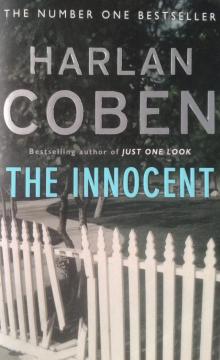 The Innocent
The Innocent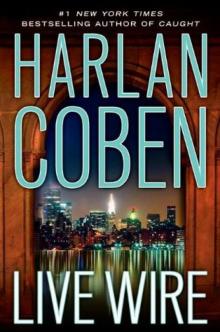 Live Wire
Live Wire Play Dead
Play Dead Drop Shot
Drop Shot Seconds Away
Seconds Away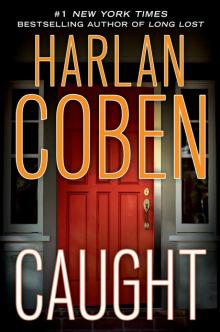 Caught
Caught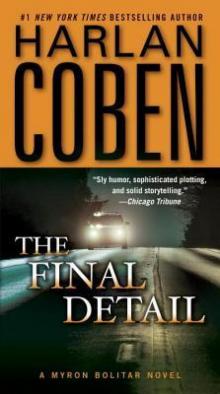 The Final Detail
The Final Detail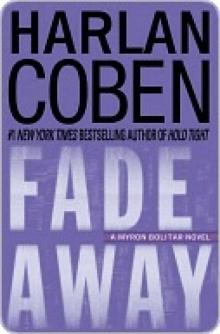 Fade Away
Fade Away Home
Home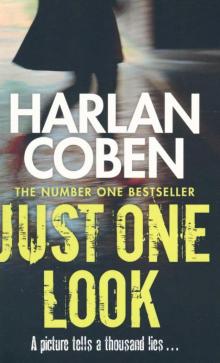 Just One Look
Just One Look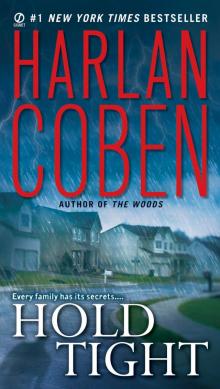 Hold Tight
Hold Tight Fool Me Once
Fool Me Once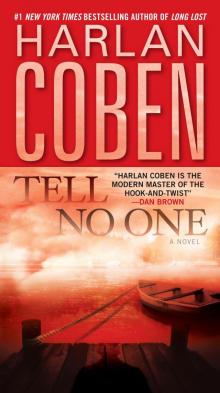 Tell No One
Tell No One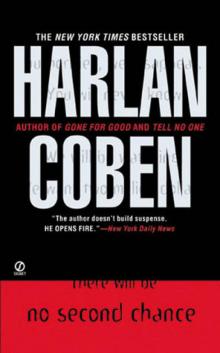 No Second Chance
No Second Chance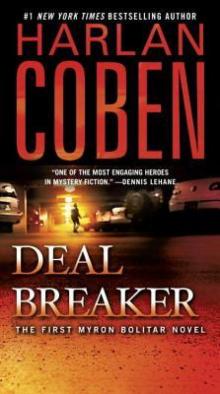 Deal Breaker
Deal Breaker Long Lost
Long Lost One False Move
One False Move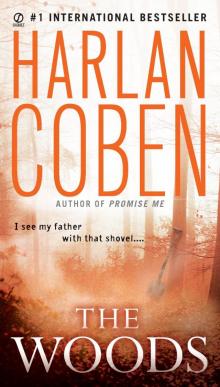 The Woods
The Woods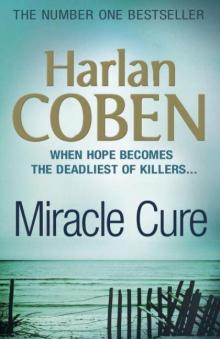 Miracle Cure
Miracle Cure Found
Found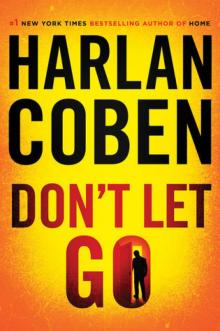 Don't Let Go
Don't Let Go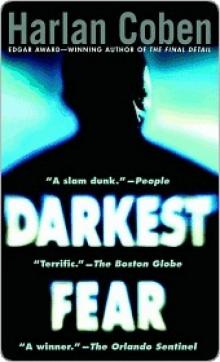 Darkest Fear
Darkest Fear The Stranger
The Stranger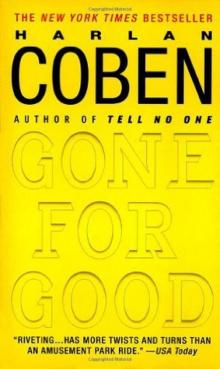 Gone for Good
Gone for Good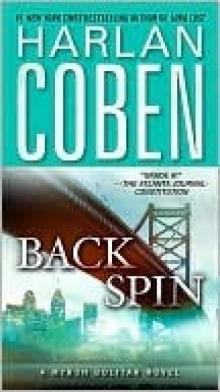 Back Spin
Back Spin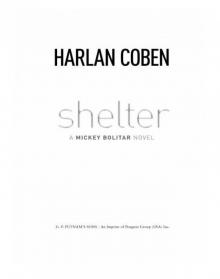 Shelter
Shelter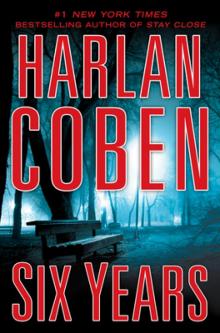 Six Years
Six Years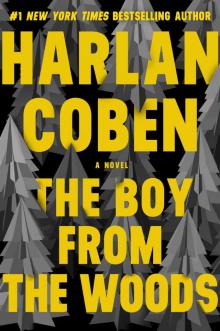 The Boy from the Woods
The Boy from the Woods Missing You
Missing You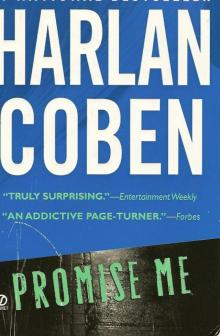 Promise Me mb-8
Promise Me mb-8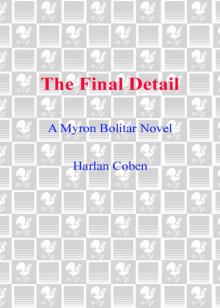 The Final Detail: A Myron Bolitar Novel
The Final Detail: A Myron Bolitar Novel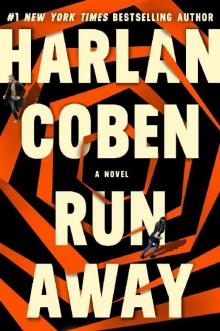 Run Away
Run Away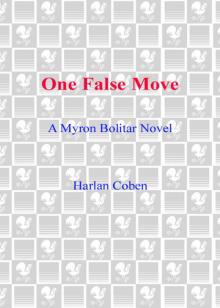 One False Move: A Myron Bolitar Novel
One False Move: A Myron Bolitar Novel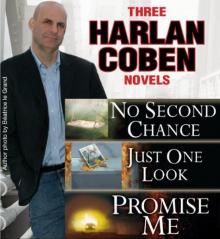 Three Harlan Coben Novels
Three Harlan Coben Novels the Woods (2007)
the Woods (2007) Tell No One (2001)
Tell No One (2001) the Innocent (2005)
the Innocent (2005)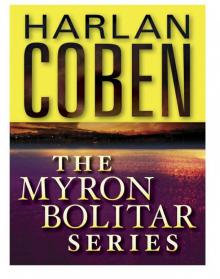 The Myron Bolitar Series 7-Book Bundle
The Myron Bolitar Series 7-Book Bundle Gone for Good (2002)
Gone for Good (2002) Caught (2010)
Caught (2010) Hold Tight (2008)
Hold Tight (2008)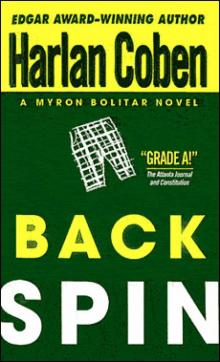 04 - Back Spin
04 - Back Spin Miracle Cure (1991)
Miracle Cure (1991) Harlan Coben 3 Novel Collection
Harlan Coben 3 Novel Collection Just One Look (2004)
Just One Look (2004)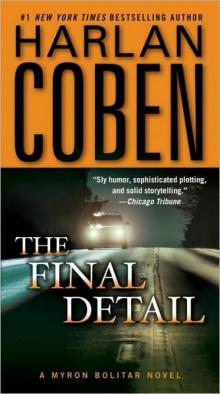 The Final Detail mb-6
The Final Detail mb-6 Play Dead (2010)
Play Dead (2010)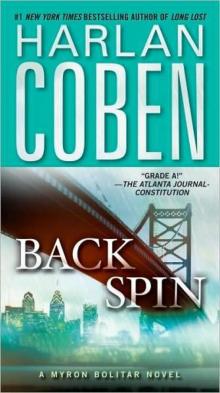 Back Spin mb-4
Back Spin mb-4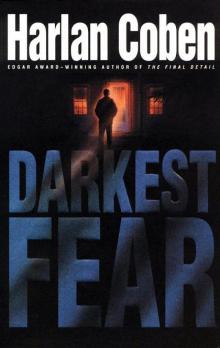 Darkest Fear mb-7
Darkest Fear mb-7